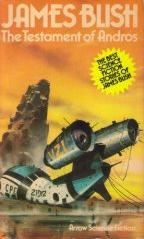
The Testament of Andros
James Blish
216 pages
published in 1973
James Blish was a science fiction writer of the same generation as Isaac Asimov, the first science fiction writers to have grown up with science fiction as a separate genre, to have become science fiction fans before they became science fiction writers. Blish’s first short stories were written in the early forties, before World War II interfered, so it was only in the fifties that he made his reputation. During that decade he wrote quite a few classic short stories and novels, including the Cities in Flight series, with its vision of New York flying off
amongst the stars and A Case of Conscience, in which a young Jesuit wrestles with the question whether or not the aliens he lives amongst posses souls. At the same time, writing under the pseudonym of William Atheling, Jr., he was one of the pioneers in applying literary criticism to science fiction. His later work is less interesting, being spend mostly on writing Star Trek novels.
Though Blish is an important early science fiction writer, one who has written several excellent novels and short stories, I’ve always found myself a bit lukewarm about him. I’ve read the novels I’ve mentioned above, attempted some other, later works of his, as well as most of his better known short stories; they were alright, but no more than that. Part of the trouble I had with him is that he, for a science fiction writer, had quite a conservative pessimistic atttitute towards the future, adhering to a Spenglerian, cyclical view of history, most notably in the Cities in Flight series. I got nothing against a bit of conservatism or pesssimism in my science fiction perse, even if I don’t share it, but Blish’s philosophy is a particularly dreary one.